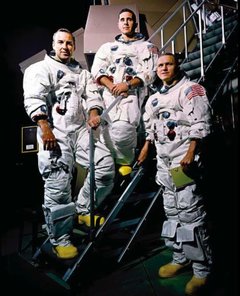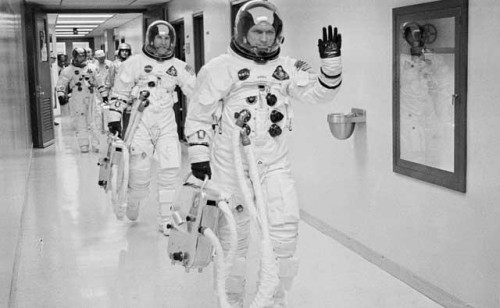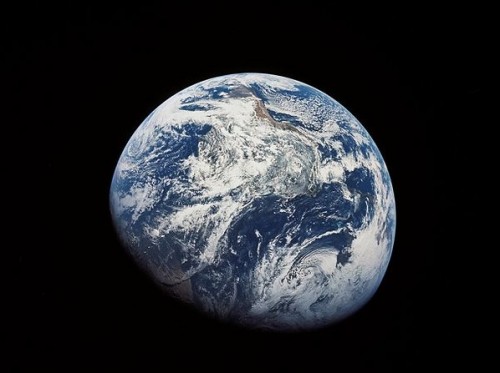 Apollo 8 wasn't just a NASA mission; it was the biggest, coolest, most mind-blowing Christmas special of all time.
Apollo 8 wasn't just a NASA mission; it was the biggest, coolest, most mind-blowing Christmas special of all time.The men of Apollo 8 -Frank Borman, James Lovell, and William Anders- had their work cut out for them. They were slated to become the first humans ever to leave the Earth's orbit, enter lunar orbit, and see the far side of the Moon. But as their launch date approached in December 1968, NASA added an even more terrifying task to the crew's to-do list: public speaking. The agency wanted the astronauts to host a live broadcast from the spacecraft on Christmas Eve. Worse still, the men were given only one cryptic instruction: "Say something appropriate."
The astronauts were in a tough spot. When millions of people of different faiths and backgrounds are listening, what exactly constitutes appropriate? To make matters trickier, 1968 had been a grim year for Americans -the Vietnam War was raging, and Robert Kennedy and Martin Luther King, Jr. had both been assassinated. How could the astronauts simultaneously orbit the Moon, introduce millions to outer space on TV, and buoy the American spirit?

The men were stumped. They began enlisting the help of media experts, who were mostly just as clueless as they were. The answer finally came from the wife of Joe Laitin, a former reporter who'd worked as a public affairs officer under five presidents. She made an elegant, simple suggestion: Why not just read from the book of Genesis?
The astronauts jumped at the idea. They reasoned that genesis had a broad enough appeal across religions to add a hint of spirituality without ostracizing non-Christians. Borman, the mission's commander, had the first ten verses typed onto fireproof paper and tucked the sheet into his flight plan. The astronauts had their script.
The broadcast began with the crew showing some of the first images of Earth ever seen from space. Lovell remarked, "The vast loneliness up here of the Moon is awe-inspiring, and it makes you realize just what you have back there in Earth."

Viewers were captivated. But as airtime dwindled, Anders revealed that the crew had a special message for all the people of the planet. He started with the familiar "In the beginning, God created the heaven and the Earth..."
He read the first four verses; Lovell read four more. Borman recited the last two and ended the show, saying, "And from the crew of Apollo 8, we close with a good night, good luck, a Merry Christmas, and God bless all of you -all of you on the good Earth."
In the end, the crew's effort paid off. Half a billion people tuned in, making it the largest TV event in history at the time, and the reception was overwhelmingly positive; even Walter Cronkite admitted that he had tears in his eyes. Of course, not everyone on Earth was thrilled; one atheist activist sued NASA for interjecting religion into a government project, but the Supreme Court dismissed the lawsuit. Enough nitpicking! The Christmas Eve special won an Emmy, and Time made the crew the magazine's "Men of the Year" for 1968. The broadcast was truly out of this world.
_______________________
 The article above, written by Ethan Trex, is reprinted with permission from the Scatterbrained section of the November-December 2011 issue of mental_floss magazine. Get a subscription to mental_floss and never miss an issue!
The article above, written by Ethan Trex, is reprinted with permission from the Scatterbrained section of the November-December 2011 issue of mental_floss magazine. Get a subscription to mental_floss and never miss an issue!Be sure to visit mental_floss' website and blog for more fun stuff!






Shuttle?? The shuttle was 13 years in the future. it was a command module. Journalism. Sheesh.